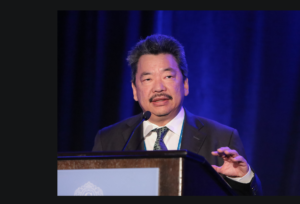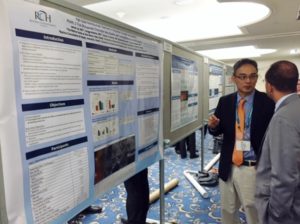Dr. Kokame and Dr. Lai attended the Retina Society’s 49th annual meeting on September 14-17, 2016, in San Diego, California. The Retina Society is one of the oldest, most prestigious retina organizations in the country comprised of well-established doctors who are dedicated to the study of the retina and its diseases. The Retina Society selects members based on training and academic contributions to the field of retina. Presentations on new studies, findings, and surgical techniques are given at each annual meeting to promote education, professional interaction, and improvement of patient care.
Dr. Kokame gave two presentations at this year’s annual meeting. His first presentation titled “Bilateral Vision Loss Associated with Progressive Outer Retinal Abnormality”, was presented in the category “Interesting Retinal Cases.” The presentation was well received and sparked discussions amongst some of the most knowledgeable specialists in the field. The second presentation, “En-face spectral domain optical coherence tomography in polypoidal choroidal vasculopathy”, was a podium presentation that compared the non-invasive imaging technique to the traditional imaging with ICG for the diagnosis of PCV.
Dr. Lai ‘s presentation entitled “High-Dose Ranibizumab Treatment in Polypoidal Choroidal Vasculopathy”, PEARL 2 Trial (Polypoidal Choroidal Vasculopathy with IntravirtEAl Ranibizumab (Lucentis), was a 2-year clinical trial conducted by the Retina Consultants of Hawaii that examined the effect of high dose Ranibizumab for the treatment of polypoidal vasculopathy (PCV), a subtype of wet macular degeneration that is more commonly found in Asians and is quite prevalent in Hawaii.
Overall, the Retina Society promotes physician interaction and education allowing for the spread of new knowledge in the field of ophthalmology. The doctors of RCH will continue to attend, present, and learn at these annual meetings so that patient care in Hawaii and the world will continue to improve.




No comments yet.